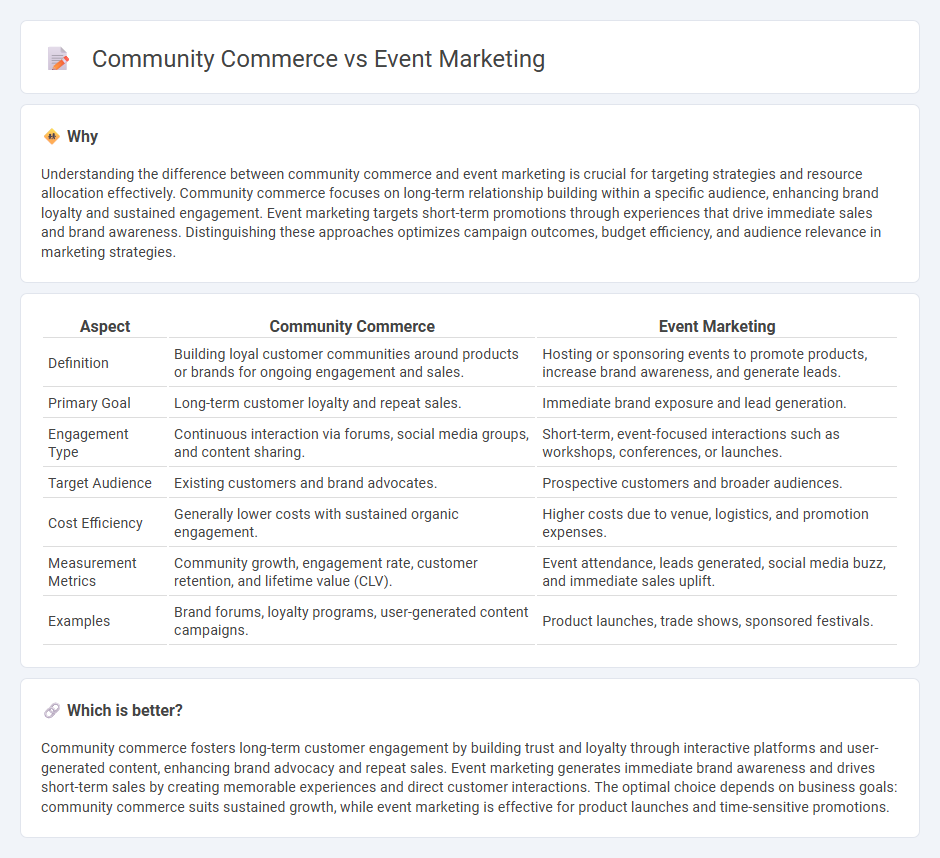
Community commerce fosters long-term customer relationships by leveraging shared interests and social connections to drive organic growth and brand loyalty. Event marketing creates immersive experiences that generate immediate engagement and direct consumer interaction, often boosting short-term sales and brand awareness. Explore the unique benefits and strategies of community commerce versus event marketing to enhance your business success.
Why it is important
Understanding the difference between community commerce and event marketing is crucial for targeting strategies and resource allocation effectively. Community commerce focuses on long-term relationship building within a specific audience, enhancing brand loyalty and sustained engagement. Event marketing targets short-term promotions through experiences that drive immediate sales and brand awareness. Distinguishing these approaches optimizes campaign outcomes, budget efficiency, and audience relevance in marketing strategies.
Comparison Table
| Aspect | Community Commerce | Event Marketing |
|---|---|---|
| Definition | Building loyal customer communities around products or brands for ongoing engagement and sales. | Hosting or sponsoring events to promote products, increase brand awareness, and generate leads. |
| Primary Goal | Long-term customer loyalty and repeat sales. | Immediate brand exposure and lead generation. |
| Engagement Type | Continuous interaction via forums, social media groups, and content sharing. | Short-term, event-focused interactions such as workshops, conferences, or launches. |
| Target Audience | Existing customers and brand advocates. | Prospective customers and broader audiences. |
| Cost Efficiency | Generally lower costs with sustained organic engagement. | Higher costs due to venue, logistics, and promotion expenses. |
| Measurement Metrics | Community growth, engagement rate, customer retention, and lifetime value (CLV). | Event attendance, leads generated, social media buzz, and immediate sales uplift. |
| Examples | Brand forums, loyalty programs, user-generated content campaigns. | Product launches, trade shows, sponsored festivals. |
Which is better?
Community commerce fosters long-term customer engagement by building trust and loyalty through interactive platforms and user-generated content, enhancing brand advocacy and repeat sales. Event marketing generates immediate brand awareness and drives short-term sales by creating memorable experiences and direct customer interactions. The optimal choice depends on business goals: community commerce suits sustained growth, while event marketing is effective for product launches and time-sensitive promotions.
Connection
Community commerce leverages engaged groups to drive sales through trust and social interaction, creating authentic customer experiences. Event marketing enhances this by providing interactive platforms that deepen brand connections and foster real-time engagement within communities. Together, they build a cohesive ecosystem where communities actively participate in commerce through shared experiences and direct involvement.
Key Terms
**Event Marketing:**
Event marketing leverages live, in-person or virtual experiences to engage target audiences, drive brand awareness, and generate leads through interactive and memorable activities. This strategy emphasizes direct customer interaction, real-time feedback, and immersive brand storytelling, often resulting in higher engagement rates and stronger emotional connections compared to traditional advertising. Discover how event marketing can powerfully transform your brand's outreach and customer engagement strategy.
Sponsorship
Event marketing leverages sponsorships to enhance brand visibility and directly engage target audiences during live experiences, creating immediate impact through immersive activities and branded content. Community commerce sponsorships build long-term brand loyalty by integrating support into ongoing community interactions, fostering trust and sustained customer relationships. Explore comprehensive strategies to optimize sponsorship impact in both event marketing and community commerce contexts.
Experiential Activation
Experiential activation in event marketing creates immersive brand experiences that engage audiences and drive emotional connections, enhancing brand recall and customer loyalty. Community commerce leverages collective consumer interactions within a community to generate authentic engagement and foster trust-driven purchases. Explore the distinct advantages of experiential activation to elevate your marketing strategy effectively.
Source and External Links
What is Event Marketing: Key Concepts, Proven Strategies ... - Eventtia - Event marketing connects businesses with audiences through live events like conferences or workshops, creating memorable experiences that build trust and excitement around products or services by engaging attendees directly and offering educational content.
Event Marketing: Strategy Guide + Tips - Adobe Experience Cloud - Event marketing involves designing themed exhibits or presentations to promote a brand, and effective campaigns use remarketing, content, and social media strategies to drive event attendance and engagement.
What is Event Marketing? Definition, Benefits, and... | ActiveCampaign - Event marketing is a strategic approach to promote products, services, or brands via in-person, virtual, or hybrid events, offering benefits like lead generation, brand awareness, networking, and building customer loyalty.
 dowidth.com
dowidth.com